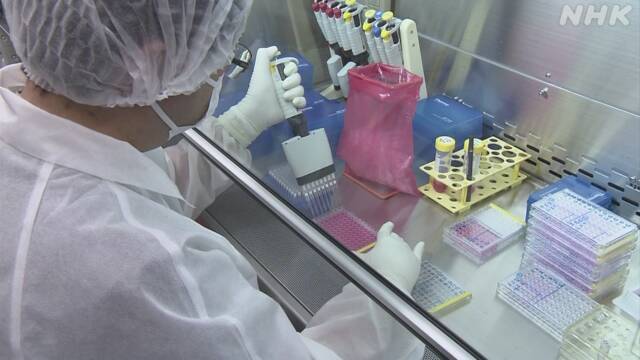How do mutations in the new coronavirus affect the effectiveness of the vaccine?
A research group at Yokohama City University has begun research on the effectiveness of vaccines against mutant viruses by collecting blood from vaccinated people.
The new coronavirus is repeatedly mutated one after another, and some mutant viruses have been pointed out that the vaccine may not be effective.
Under these circumstances, a research group at Yokohama City University has begun research on how effective vaccines inoculated in Japan are against mutant viruses.
In the research, blood is collected with the cooperation of the vaccinated person, and the function of "neutralizing antibody" against the mutant virus is investigated by the technology newly developed by the research group.
Neutralizing antibodies work to prevent infection, but new technology means that neutralizing antibodies can be measured within 3 hours.
The research group will collect blood from 100 vaccinated people and, for the time being, analyze the effectiveness of the vaccine against mutant viruses that spread in the United Kingdom and South Africa, as well as Brazil and Japan.
Furthermore, whenever a new mutant virus emerges in the future, we will analyze it.
Professor Takeharu Yamanaka of the Graduate School of Data Science, Yokohama City University, who is a member of the research group, said, "Since viruses mutate at a tremendous speed, it will be necessary to evaluate the effectiveness of vaccines in a short time. By clarifying the effects of the vaccine with data, we can think about what kind of measures are needed. "
What is the new technology we have developed?
This research utilizes new technology developed by a research group at Yokohama City University.
The group created special particles that resembled the new coronavirus.
Attach the mutated virus peplomer to this.
Then, the serum is taken from the blood of the vaccinated person and crossed.
After that, it is administered to monkey cells and examined whether a "neutralizing antibody" that has the ability to prevent infection works.
According to the research group, the measurement of "neutralizing antibody" generally takes 72 hours to 1 week, but this time it can be analyzed within 3 hours.
It takes time to measure when using a real virus because of the risk of infection, but with this technology, it is possible to measure safely in a short time by using particles that resemble a virus.
In addition, the technique allows simultaneous testing of efficacy against multiple mutant viruses.
The research group wants to collect the blood of about 100 vaccinated people, verify the effect of the vaccine against mutant viruses, and accumulate data unique to Japanese people.

